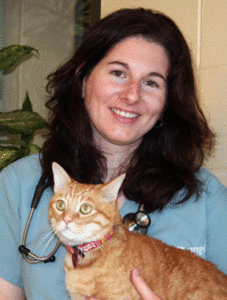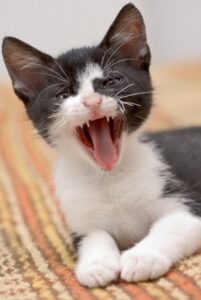-
Adopt
-
Veterinary Care
Services
Client Information
- What to Expect – Angell Boston
- Client Rights and Responsibilities
- Payments / Financial Assistance
- Pharmacy
- Client Policies
- Our Doctors
- Grief Support / Counseling
- Directions and Parking
- Helpful “How-to” Pet Care
Online Payments
Referrals
- Referral Forms/Contact
- Direct Connect
- Referring Veterinarian Portal
- Clinical Articles
- Partners in Care Newsletter
CE, Internships & Alumni Info
CE Seminar Schedule
Emergency: Boston
Emergency: Waltham
Poison Control Hotline
-
Programs & Resources
- Careers
-
Donate Now

angell.org/generalmedicine
617-522-7282
It’s 3am, and your cat won’t stop meowing. She had a good afternoon play session with her favorite mouse toy, and she has access to food, water, and a clean litter box. So why won’t she let you sleep?
Increased vocalization, especially at night, can be very disruptive. Here are a few common causes.
- Hyperthyroidism – This condition is not uncommon in older cats and is usually caused by a benign growth on the thyroid gland. The growth causes the overproduction of thyroid hormone which can cause the cat to eat a lot but still lose weight, drink excessively, or experience a change in behavior. In addition to excessive vocalization it can also cause muscle deterioration, heart disease, vomiting and diarrhea, etc. The condition is fairly easy to diagnose in most cats, and effective treatment is available. For more information visit org/hyperthyroid or angell.org/I131.
- Hypertension – Also known as high blood pressure, this condition is most often diagnosed in cats with kidney disease. We aren’t sure how hypertension leads to increased vocalization, but discomfort is one theory. People with high blood pressure often experience headaches, so the same might be true for cats. High blood pressure can be treated with medication.
- Sensory Decline – Cats with hearing and/or vision loss tend to vocalize more than other cats. The sensory loss likely creates some anxiety, as the lack of sensory input might make a cat feel isolated. Cats with hearing loss also tend to vocalize loudly since they aren’t aware of their own volume. Leaving a few lights on at night may help a visually impaired cat feel more at ease.
- Cognitive Dysfunction – This condition is a result of brain aging in older cats. Common signs are nighttime waking (often with vocalization), decreased interaction with people, urinating and defecating in inappropriate locations, and wandering aimlessly. Studies have shown that almost 1/3 of cats between the ages of 11-14 demonstrate at least one sign of cognitive dysfunction. While there is currently no cure for cognitive dysfunction, there are supplements and medications that are quite effective in improving clinical signs.
Any significant behavior change is an indication to have your cat evaluated by a veterinarian. While increased vocalization in a young cat is likely to be due to a desire for food or attention, an older cat is more likely to have an underlying medical condition. Your veterinarian can recommend testing and treatments in order to help both of you to get a good night’s sleep.
